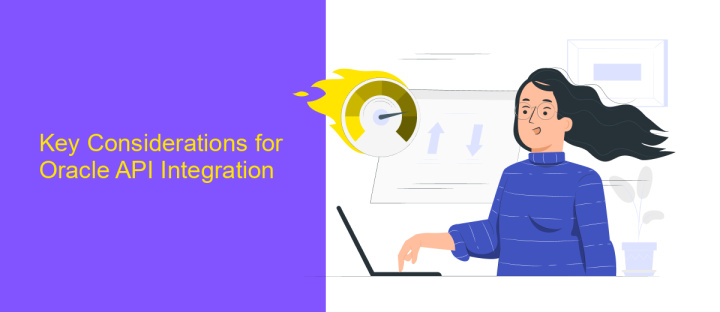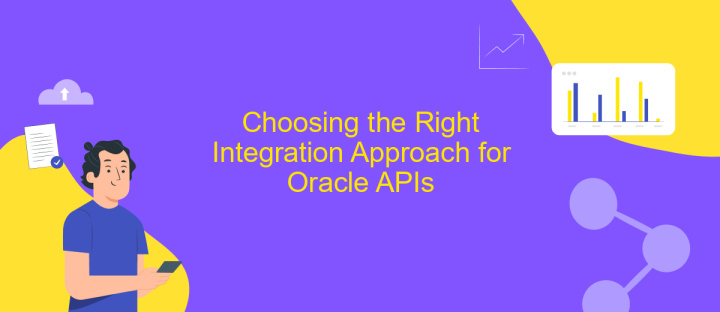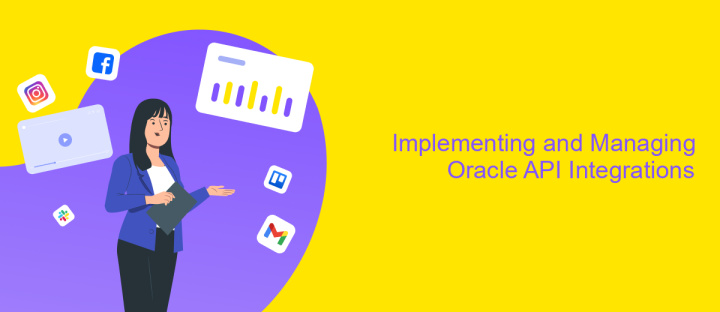Oracle API Integration
In today's fast-paced digital landscape, seamless integration of various software systems is crucial for business success. Oracle API Integration offers a powerful solution for connecting disparate applications, enabling efficient data exchange and streamlined workflows. By leveraging Oracle's robust API management capabilities, organizations can enhance their operational efficiency, improve customer experiences, and drive innovation. This article explores the key benefits and strategies for implementing Oracle API Integration effectively.
Understanding Oracle APIs and Integration Needs
Oracle APIs are essential tools that facilitate seamless integration between Oracle applications and other systems. These APIs enable developers to access and manipulate data, automate processes, and extend the functionality of Oracle software. Understanding the integration needs of an organization is crucial for leveraging Oracle APIs effectively. This involves identifying the specific business processes that require integration, the data flow between systems, and the desired outcomes of the integration.
- Identify key business processes that need integration.
- Determine data flow and transformation requirements.
- Assess security and compliance considerations.
- Evaluate scalability and performance needs.
- Plan for maintenance and future scalability.
By comprehensively understanding these integration needs, organizations can design and implement solutions that enhance efficiency, reduce manual effort, and improve data accuracy. Oracle APIs provide the flexibility and power needed to create robust integrations that align with business goals. As companies continue to adopt cloud-based solutions and digital transformation strategies, leveraging Oracle APIs becomes increasingly important for maintaining competitive advantage and operational excellence.
Key Considerations for Oracle API Integration

When integrating Oracle APIs, it's crucial to first evaluate the specific requirements of your business processes. Understanding these needs will guide you in selecting the appropriate APIs and ensuring they align with your organizational goals. Additionally, consider the scalability of the integration. As your business grows, the demands on the APIs may increase, so it's important to choose solutions that can handle future expansion without compromising performance.
Security is another key consideration. Ensure that the APIs you are integrating comply with industry standards and best practices for data protection. This includes implementing robust authentication and encryption methods. Furthermore, tools like ApiX-Drive can simplify the integration process by providing a user-friendly platform to connect Oracle APIs with other applications seamlessly. ApiX-Drive offers automated workflows and real-time data synchronization, which can enhance efficiency and reduce manual errors. By addressing these considerations, you can create a reliable and effective Oracle API integration strategy that supports your business objectives.
Choosing the Right Integration Approach for Oracle APIs

Choosing the right integration approach for Oracle APIs is crucial for optimizing system performance and ensuring seamless data flow. The choice depends on several factors, including the complexity of the integration, the data volume, and the specific business requirements. Understanding these factors will help in selecting an approach that aligns with organizational goals and technical capabilities.
- Assess the complexity of your integration needs. Determine whether you require a simple data transfer or a more complex, real-time integration.
- Evaluate the volume of data to be processed. High data volumes may necessitate batch processing, while smaller volumes might be suitable for real-time processing.
- Consider the specific business requirements. Identify any unique constraints or objectives that could influence the integration approach, such as security or compliance needs.
By carefully analyzing these factors, organizations can choose an integration strategy that not only meets current demands but also scales with future growth. This strategic alignment ensures that Oracle APIs are leveraged effectively, providing robust solutions that drive business success. Ultimately, the right integration approach enhances operational efficiency and supports strategic initiatives.
Implementing and Managing Oracle API Integrations

Integrating Oracle APIs into your system involves a strategic approach to ensure seamless connectivity and functionality. Start by identifying the specific APIs that align with your business needs. This involves understanding the API documentation, which provides details on endpoints, request types, and authentication methods. Proper planning at this stage can prevent future integration issues.
Once the necessary APIs are identified, the next step is to implement them. This involves coding the integration logic, which includes handling API requests and responses, managing data transformations, and ensuring secure communication. It's crucial to test the integration thoroughly to verify its reliability and performance under various conditions.
- Regularly update APIs to leverage new features and security patches.
- Monitor API usage to optimize performance and identify potential issues.
- Implement robust error handling to manage unexpected API failures.
- Maintain comprehensive documentation for future reference and troubleshooting.
Managing Oracle API integrations is an ongoing process that demands attention to detail and proactive maintenance. By continuously monitoring and refining your integrations, you can ensure they remain efficient and aligned with your evolving business objectives. This approach not only enhances operational efficiency but also maximizes the value derived from Oracle's extensive API offerings.
- Automate the work of an online store or landing
- Empower through integration
- Don't spend money on programmers and integrators
- Save time by automating routine tasks
Best Practices and Future Trends in Oracle API Integration
In the realm of Oracle API integration, adhering to best practices is crucial for seamless operations and enhanced performance. One essential practice is ensuring robust security protocols, such as OAuth 2.0, to safeguard data during transmission. Additionally, implementing comprehensive error handling mechanisms can significantly reduce downtime and improve user experience. Utilizing tools like ApiX-Drive can simplify the integration process, offering user-friendly interfaces and automation capabilities that streamline data flow across various platforms. Monitoring and logging are also vital, providing insights into API performance and facilitating quick troubleshooting.
Looking towards future trends, the integration landscape is evolving with the rise of AI and machine learning, enabling more intelligent and predictive API interactions. The adoption of microservices architecture is becoming more prevalent, promoting scalability and flexibility in API deployments. Moreover, the emphasis on low-code and no-code solutions is increasing, empowering non-developers to participate in API integration processes. As businesses continue to digitalize, staying updated with these trends will be key to maintaining a competitive edge in Oracle API integration.
FAQ
What is Oracle API Integration?
How can I automate Oracle API integrations?
What are the benefits of integrating Oracle APIs with other systems?
Can I integrate Oracle APIs with cloud-based applications?
What should I consider when choosing an integration platform for Oracle APIs?
Time is the most valuable resource for business today. Almost half of it is wasted on routine tasks. Your employees are constantly forced to perform monotonous tasks that are difficult to classify as important and specialized. You can leave everything as it is by hiring additional employees, or you can automate most of the business processes using the ApiX-Drive online connector to get rid of unnecessary time and money expenses once and for all. The choice is yours!


